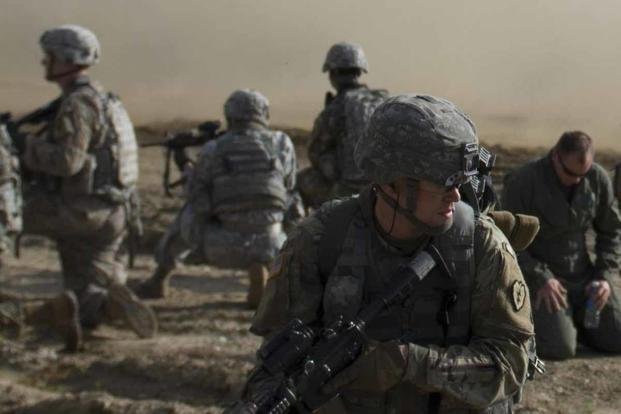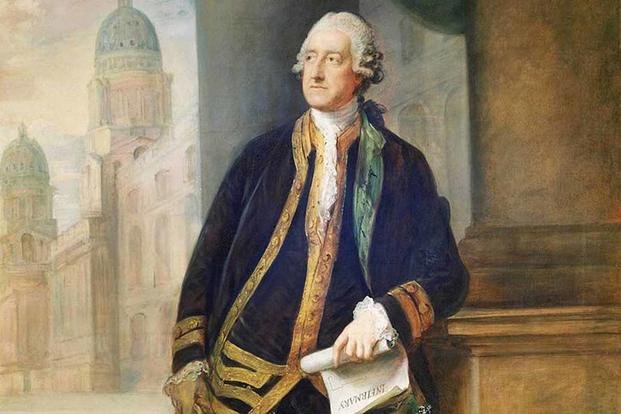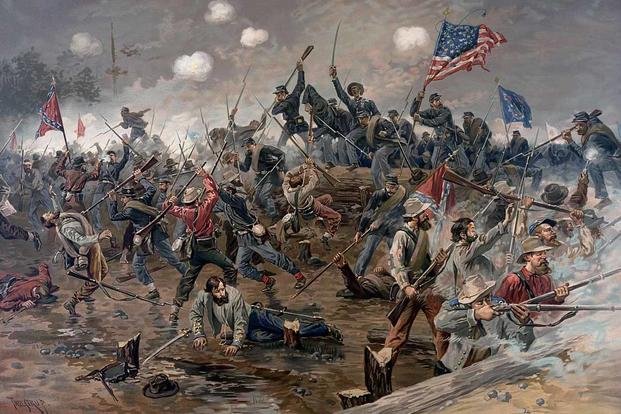It was only a matter of time before the current climate of unrest led back to the U.S. military -- and its 10 Army bases named for Confederate generals, all spread throughout the former Confederacy.
Whether to rename them continues to be a contentious political issue, but the practical-minded among us have moved on. If they are renamed, what will they be called?
So, without once using the term "Forty McFortFace," here are a few suggestions -- some entirely serious, some very not -- for changing those 10 antiquated base names.
Related: Defense Bill Moving Forward With Measure to Scrub Confederate Names from Bases
1. Fort Benning (Georgia)
This Columbus, Georgia, base was named after Confederate Gen. Henry L. Benning, who fought against the Union armies at the Second Battle of Bull Run, Antietam and Gettysburg. It was named for him in 1918, while many Civil War veterans were still alive. That doesn't mean it needs to keep the name.
For sheer coolness factor, the base could be renamed for former NFL Wide Receiver Calvin Johnson, whose hometown is just an hour away from Columbus. Enemies would think twice if they knew they would be facing soldiers from Fort Megatron.

In all seriousness, though, renaming Fort Benning will likely be the easiest rechristening of this whole list, as the military's basic paratrooper training is conducted here. The base could be named for Maj. General William C. Lee, the "Father of the U.S. Airborne," and the first commander of the Army's "jump school."
Naming it "Fort William C. Lee" isn't weird, either. Just ask the residents of Fort George G. Meade.
2. Fort Lee (Virginia)
So what to do with Fort Lee, Virginia, now that Fort William C. Lee is in Georgia? The current Fort Lee was named for Robert E. Lee, commander of the Army of Northern Virginia. Even though the federal government seized his estate and turned it into Arlington National Cemetery, it still somehow thought it appropriate to name a base after him.

A decent thing to do would be to name the base, once a training center for the Women's Army Corps (WAC), after the WAC's first director, Oveta Culp Hobby. As the WAC accepted women of all races, it would be a fitting rebranding effort. Gen. Douglas MacArthur did call the WACs "his best soldiers," after all.
If that doesn't garner enough support, renaming the installation for Lee's famous adversary should. Situated in the greater Richmond region, renaming Fort Lee to Fort Grant would send a positive message to the people who look up to the U.S. Army. Grant owned one slave in his life, acquired from his father-in-law, and set the man free in less than a year.
3. Fort Bragg (North Carolina)
Besides being named for a Confederate general, Fort Bragg should be renamed because it's the home of Army Special Forces, the 75th Ranger Regiment and the Air Force Combat Control School -- and it's named for American history's worst general.
Bragg lost almost every battle he commanded, always took the opposite of good advice and once even misplaced a line of men.
Is this who we want the home of Army Special Forces to be named for?

There are a bevy of candidates that would be better suited for the name of such a place. "The President of the Underground Railroad," Levi Coffin, got his start helping fugitive slaves in Greensboro, North Carolina. "Fort Coffin," however, sounds, well ... So maybe that's a no.
Then there's Hiram Revels, born a free man in Fayetteville, he helped organize two regiments of the then-called United States Colored Troops and served as their chaplain. Later, he became the first African American U.S. senator, representing Mississippi.
Fort Revels sounds like a name appropriate for a base in Fayettenam.
4. Fort Hood (Texas)
This Killeen, Texas-based installation is named for John Bell Hood, a Confederate who wasn't even from Texas. Known for his bravery, all that bravado didn't help him even slow down Gen. William Tecumseh Sherman on his way to burn down the South and everything they loved. Surely, Texans have a number of people they would prefer to honor over a Confederate. It's Texas. TEXAS.
For starters, how about the most decorated soldier who ever lived, a World War II Medal of Honor recipient born in Kingston, Texas, who went from enlisted man to officer, then starred in the hit movie about his own life: Audie Murphy.

Fort Murphy would have much better pedigree than Fort Hood, named for a general who peaked before the Civil War was even halfway over.
5. Fort Polk (Louisiana)
What does one rename the most reviled duty station in all of the U.S. Army? Surely, we can honor someone other than a guy with no previous military experience whose Civil War claim to fame is that he died in it.
Louisiana is one of the most unique states in the Union, with a history unlike any other. But again, for sheer coolness factor, we could rename this for Union Col. Algernon Sidney Badger. Badger was from Massachusetts but served at the Battle of Mobile Bay and ended up in Louisiana. He liked it so much, he stayed there when the war was over. Plus, the symbolism of a badger killing a snake is too good to pass up.
Who wouldn't want to be stationed at Fort Badger?
But the top candidate for Fort Polk's new name has to be William C.C. Claiborne, the first American governor of Louisiana. He was conciliatory toward native tribes under his jurisdiction and tried to secure clemency for the captured organizers of the largest slave revolt in U.S. history. He also negotiated for the help of the pirate Jean Lafitte for the defense of New Orleans during the War of 1812.
Fort Polk is dead. Long live Fort Claiborne.
6. Fort Gordon (Georgia)
Only in the old Confederacy could you be hailed a hero upon your return from losing a war. Besides getting that particular participant trophy, John Brown Gordon's career can't be discussed without mentioning how many times he was wounded in action.

This installation also housed Camp Crockett, a training area for special operators and airborne troops preparing for action during the Vietnam War. It would be an easy historical nod to American legend Davy Crockett, who fought against the Indian Removal Act and later died fighting at the Alamo. If we want to stick to soldiers of the U.S. Army, Fort Gordon is notable because Alvin York, the famed conscientious objector-turned Medal of Honor recipient in World War I, was trained here.
Fort York has a nice ring to it. But Fort Flipper would be more appropriate.
Georgia was home to Henry O. Flipper, the first African American graduate of West Point. Can you imagine the level of harassment this man endured? Commissioned and sent to the frontier areas, he did his job well until he was improperly accused of embezzling quartermaster funds and court-martialed, an injustice to which the Army later admitted. President Bill Clinton would later pardon him.
7. Fort Pickett (Virginia)
Fort Pickett is a National Guard Base in Virginia named after a guy who led one of the most ill-advised infantry charges in history. Not just in American history, but all of world history. While Maj. Gen. George Pickett didn't order the charge at Gettysburg (Robert E. Lee did, despite all advice against it), his name got slapped on it, whether he liked it or not.

Pickett's charge led to the defeat of the Confederacy at Gettysburg, a loss from which the South couldn't recover and ultimately ended their war with loss. And we named a base after him.
A much better choice for the name of the fort would probably be Gibbon, named for Brig. Gen. John Gibbon, commander of the Union forces who stopped Pickett's part of the infamous charge.
But since this is a base belonging to the Virginia National Guard, they might want to name it after a Virginian. Luckily, there's no shortage of good Virginians, and two of them are giants of the U.S. Army's history. Gen. Douglas MacArthur considered Norfolk his home, and Gen. George C. Marshall, Army chief of staff during World War II, attended the Virginia Military Institute.
Pick one, Virginia.
8. Fort A.P. Hill (Virginia)
Then, use the other one to rename Fort A.P. Hill.
Although one of the more capable commanders on the list, this Confederate general's accomplishments include not being Stonewall Jackson, getting shot seven days before the war ended and having gonorrhea for 21 years.
9. Fort Rucker (Alabama)
Fort Rucker is named for Col. Edmund Rucker, a Confederate Army chef who designed a way for Confederate troops to live on eating grass. While that's not even remotely true, no one outside of Fort Rucker knows that or cares to Google it. Rucker wasn't even from Alabama, he just made a lot of money there.
The first suggestion for renaming the base goes to Gen. Oliver W. Dillard, the fifth African American flag officer in Army history, the first black intelligence general and a National Intelligence Hall of Famer. He joined during World War II and served through Korea, Vietnam and most of the Cold War.
But if time in service is what we're looking for, look no further than Alabama's own Sgt. Maj. Gilbert "Hashmark" Johnson. Johnson first enlisted in the Army in 1923 and was discharged as a corporal six years later. After four years as a civilian, he again enlisted, this time in the Navy. "Hashmark" was aboard the USS Wyoming when the U.S. was attacked at Pearl Harbor, but later that year, he was one of the first black men to join the United States Marine Corps.

Johnson spent another 17 years in the Corps, with a total of 32 years in service. He earned the name "Hashmark" because he had more service stripes than stripes indicating his rank. Welcome to Fort Hashmark.
10. Camp Beauregard (Louisiana)
Louisiana's National Guard runs this base, named for Confederate Gen. P.G.T. Beauregard, one of the South's most able commanders -- and one who would end up arguing for racial cooperation after the Civil War's end.
While that's admirable, there's a good chance he just wanted the votes of newly freed black men against Reconstruction-era radical Republicans, so let's not go crazy about how reconstructed Beauregard was. If we're going to choose a Louisianan with questionable motives, let's name the camp after the aforementioned pirate Jean Lafitte.

Lafitte turned from sailor/pirate/merchant to soldier in nearly a heartbeat to help the Americans defend the port city of New Orleans from outside attack, and if that doesn't sound like the National Guard, I don't know what does.
-- Blake Stilwell can be reached at blake.stilwell@military.com. He can also be found on Twitter @blakestilwell or on Facebook.
Keep Up With the Best in Military Entertainment
Whether you're looking for news and entertainment, thinking of joining the military or keeping up with military life and benefits, Military.com has you covered. Subscribe to the Military.com newsletter to have military news, updates and resources delivered straight to your inbox.














